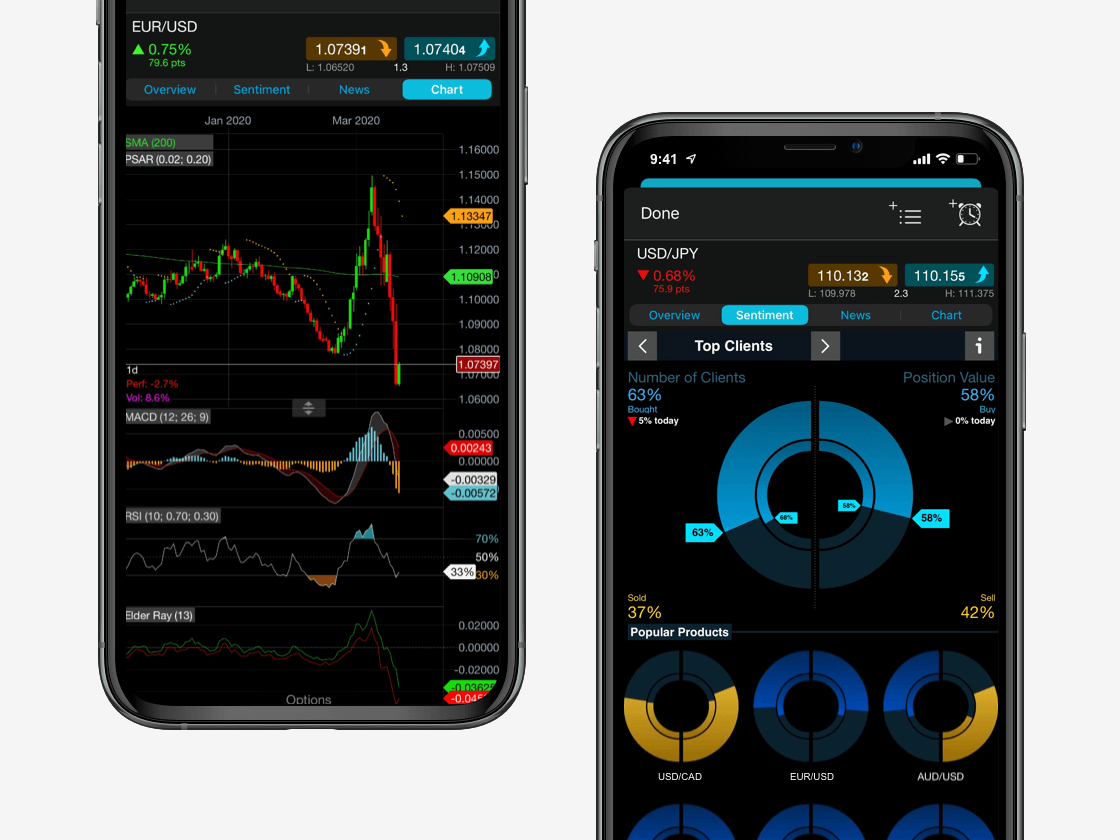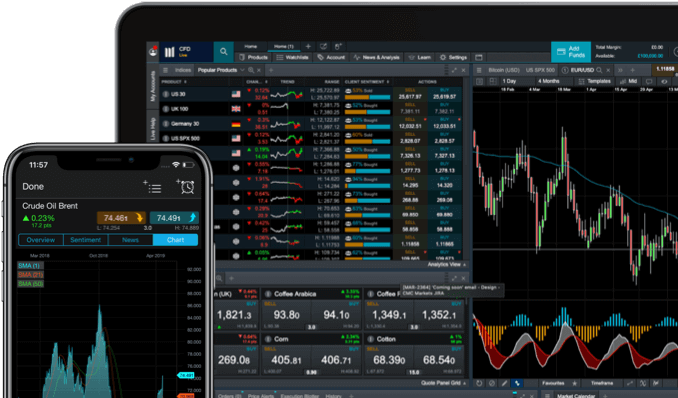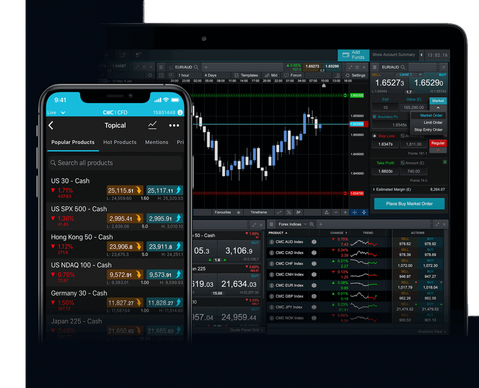Margin accounts work by offering leverage to traders to gain increased exposure to the financial markets. With a margin account, you can open a buy or sell position depending on whether you think that the value of a security will increase or decrease. The ability to participate in short selling when asset prices fall is an attractive aspect of margin trading for those who don’t want to buy and hold securities for a long period of time.
What is a margin account and how does it work?
A margin account is a type of brokerage account that lets you speculate on the price movements of securities through buy and sell positions with borrowed funds, allowing you to magnify your profit or loss. A margin account only requires you to pay a fraction of the position’s full value, known as your deposit, and you essentially borrow the rest of the funds from the broker.
How do margin accounts work?
- Placing a deposit: with a margin account, you do not pay the full value of the trade upfront and instead place a fraction of the trade, which is known as your deposit. The amount of margin that you can borrow depends on the asset. For example, a major forex pair such as EUR/USD starts at 3.3%, which equals a leverage ratio of 30:1.
- Profit and loss: as you are trading with borrowed money, this can result in either magnified profits or losses. This is applicable for both spot cash and forward products. If your trade starts heading in an unfavourable direction, you may need to decide whether to close out the position or not, in order to minimise losses.
- Margin calls: if you happen to have an unsuccessful trade, this may cost you a larger loss than your original margin deposit. If your account falls below the maintenance margin requirement, you will likely encounter a margin call. You must then add more funds to increase your equity. If you don’t act quickly, you may be forced to close any open positions to compensate for the lack of funds. Read more about margin calls. When trading with us, we notify our clients by email when this figure reaches 80% of the original account value, so that you can take appropriate action.
Different types of margin accounts
At CMC Markets, we offer two types of account that you can use to trade on margin: a spread betting account and a CFD trading account.
Spread betting account
Spread betting is a popular derivative product that allows you to trade tax-free* in the UK. After opening a spread betting account, you can speculate on the underlying price movements of over 10,000 financial assets using leverage, including stocks, forex, commodities, bonds and indices. With spread betting, you buy or sell a pre-determined amount per point of movement for the asset that you are trading, which is known as your spread bet 'stake'. For every point that the price moves in your favour, you will make a profit; however, you will make a loss for every point that the price moves against you.
CFD trading account
CFDs (contracts for difference) are another type of derivative product that describe a short-term contract between an investor and broker. Similar to spread betting, you don’t own the underlying asset. Instead, you buy or sell a number of units for a particular financial instrument, depending on whether you think its price will rise or fall. At the end of the contract, the parties exchange the difference between the opening and closing prices. CFD trading also involves the use of leverage, which gives you wider exposure to the markets, but can magnify both your profits and losses, as these are based on the full value of your position. Read more about leveraged trading.
Margin vs cash account
The two main types of brokerage accounts use margin and cash. Whereas a margin account allows traders to borrow money to in order to buy or short sell leveraged securities, a cash account requires that all transactions must be paid upfront, which are most often long (buy and hold) positions.
With a margin account, you can speculate on bull and bear markets depending on your strategy, only having deposited a small fraction of the trade’s original value. On the other hand, investors that are purchasing securities with a cash account must settle the buy order with a cash deposit, or they can sell an existing position on the same trading day.
There are pros and cons for both types of trading account, and this depends on your overall trading strategy and goals, whether they are short or long-term, and whether you have the funds readily available to pay upfront. Typically, a margin account is preferred for short-term trading, whereas a cash account is more suited to medium or long-term investments, such as pensions.
Margin account requirements
When trading with CMC Markets, there are some requirements that come with a margin account. These apply to both spread betting and CFD trading accounts.
- Firstly, some brokers have a strict minimum margin that investors are required to deposit before trading on margin. We do not enforce this, however, as you can deposit as little funds as you would like when opening an account. Obviously, these funds will need to be increased depending on the minimum stake size or number of units of the trade that you wish to open.
- Secondly, our maintenance margin requirement stands at 50%. This means that you must have at least 50% of the equity value in your account at all times to cover the position. If your account value falls below 50%, you are at risk of a margin call and may be contacted to deposit more funds in order to keep your position open.
Read more about CFD margins for more information about our products and asset classes.
How to open a margin account to spread bet or trade CFDs
- Register for an account. This will give you automatic access to a free demo account, where you can practise trading risk-free with virtual funds. If you are ready to start trading, you can deposit funds into your account.
- Decide whether you want to spread bet or trade CFDs. Read an overview of how the two products are taxed, where they are available, how profit and loss is calculated and any additional charges in our guide to spread betting vs CFDs.
- Make sure that you understand the risks of margin and leverage. Although profits can greatly increase with a margin trade, your losses will increase equally if the trade is unsuccessful. Consult our guide to risk-management for more information on how to control capital loss.
Example of a margin account
Let’s take an example of a CFD trader using a margin account to open a buy position on Company ABC’s stock.
Company ABC’s share price = £10
Our margin rate for shares = 20%
Account equity = £10,000
The trader deposits £5,000 into his account and borrows £5,000 more from the broker. He thinks that the company’s share price will increase over time, so he places a buy bet for 1,000 shares at £10, equalling a total of £10,000. Seeing as our margin rate for shares stands at 20%, the trader will only use £2,000 of his account value in order to open the position and gain exposure to the share.
There are two scenarios that could follow:
- There is a positive news release and the stock price doubles to £20 per share. The trader could then close out the position at £20,000. After repaying the £5,000 borrowed from the broker, and discounting the original £5,000 that he invested, this leaves the trader with a profit of £10,000.
- The company’s earnings report shows a negative balance sheet and cash flow, causing its stock price to drop to £5 per share. Since the trader has 1,000 shares open, this would equal a loss of £5,000, which is the same figure as the trader’s original investment. As his account value now only reflects the 50% maintenance margin requirement that is required to keep the position open, he is at risk of a margin call and will be forced to deposit more funds into the account.
The CFD trader should remember that he may run into additional costs from opening a position, including holding costs if carrying positions overnight, and execution fees if he wants to set a guaranteed stop-loss order (GSLO), for example.
Margin trading platform
Our Next Generation trading platform offers over 10,000 financial assets to speculate on using leverage. Whether you prefer long or short-term strategies, there are technical and fundamental tools to suit every trader. Browse our platform tutorials to find out more information about Next Generation and familiarise yourself with the platform.

Seamlessly open and close trades, track your progress and set up alerts
Benefits of a margin account
- You have the ability to go short (open a sell position) on certain assets and trade both sides of the market. This means that you can take advantage of price declines.
- If successful, returns will be magnified, which can amount to a large profit.
- You can diversify your portfolio with a range of asset classes, rather than putting all your eggs in one basket.
Risks of margin trading
- If unsuccessful, losses will be magnified, which can amount to a large loss of capital
- Margin trading comes with a number of costs: spread charges, commission on share positions, overnight holding costs and execution fees. Margined CFDs also require you to pay capital gains tax.
- Your account may be subject to a margin call when the equity value falls below our maintenance margin requirement.
Summary: understanding margin accounts
Below are some common FAQs that are asked when traders are looking into opening a margin account. It is a good idea to deepen your knowledge of derivative trading and products before jumping into the financial markets, as this process can come with risks, as explained above.
Open our trading account to get started.
FAQ
Can you withdraw money from a margin account?
It is possible to withdraw money from your margin account after depositing funds. This should not affect any open trades or outstanding balances, however, so make sure that your positions are covered appropriately. Read more of our account specifications.
Do I have to use margin in a margin account?
When opening a margin account with us, all traders are required to trade with margin or leverage. This is because you are practising speculative trading on the price movements of the underlying assets, and you do not take any ownership, so margin gives you better exposure to the markets. Read about the risks of trading with leverage before you open an account.
Is a margin account a good idea?
A margin account can be an effective method for short-term traders in particular, who want to open short positions rather than buying and holding assets. However, margin trading comes with various risks, and losses can exceed profits in many cases. Learn about our range of execution types that can help to control losses.
Do you have to pay back margin?
When you buy or sell securities using margin, you are required to pay back any funds that you borrowed from the broker. This is alongside additional trading costs such as commissions, holding costs and spread charges.
How long does it take to open a margin account?
It is possible to open our spread betting and CFD trading account with a number of simple steps. This includes registering with a valid email address, verifying your account and submitting personal details. This will help us to decide whether you are eligible for an account. You will first be granted access to a free demo account and then choose whether to apply for a live account and deposit funds. Read more about our account types.
Can I lose more than I have in my margin account?
You can potentially lose more money than you invest in your margin account. This is because you are borrowing funds from the broker, and losses are based on the full value of the position, not only the deposit. Consult our risk-management guide for information on how to control the risks of margin and leverage in order to protect your capital.
Who is eligible to open a margin account?
There are no set criteria for who is able to open an account with us, as we welcome both beginner and experienced traders. However, you will be asked questions about age, occupation and country of residence, which may affect the outcome of your application.
*Tax treatment depends on individual circumstances and can change or may differ in a jurisdiction other than the UK.

